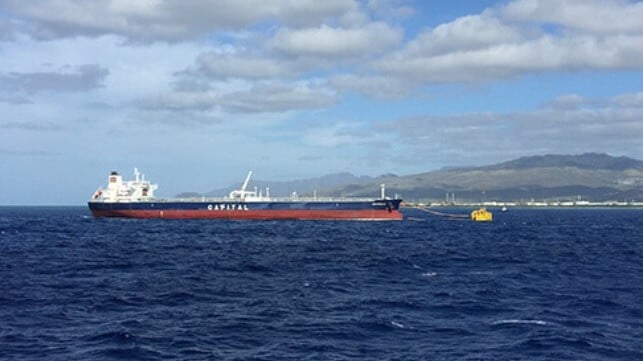Russian Oil Ban Prompts Renewed Calls for Jones Act Waivers

The ban on importation of Russian crude has led to a renewed call for Jones Act waivers - this time, in order to allow foreign-flagged tankers in U.S. coastwise trade. Congressman Ed Case (D-HI) has called on the White House to allow the shipment of petroleum to the Hawaiian market "from other domestic locations on non-Jones Act vessels."
Rep. Case supported the ban on Russian petroleum, but he noted that Hawaiian consumers will bear a greater share of the consequences of the prohibition than citizens in other states. Hawai'i's sole refinery gets almost all of its oil from foreign nations, and about one third comes from Russia. Domestic oil from the mainland would be the best replacement for Russian imports, Case argued, but he asserted that it is too expensive because of domestic shipping requirements.
"The costs of such shipping, even if it were available domestically to start with, would be higher by a number of multiples than transport on the plethora of non-U.S. flagged specialty vessels," Case claimed. "By some accounts, shipping oil from the mainland U.S. to Hawai?i, a far shorter distance than from foreign sources, costs nearly three times as much as shipping from Asia . . . These costs would be passed on in price increases that are already among the highest in our country and would directly affect our national defense headquartered in Hawai’i."
The American Maritime Partnership, the association of Jones Act vessel operators, pushed back on these arguments Thursday by arguing that shipping costs are but a small fraction of the final cost at the pump - and that oil prices are the real culprit for gasoline price hikes.
"Today there is more than adequate American vessel capacity to address any requirements to transport oil within the United States. Calls for waivers to the Jones Act now are both inconsistent with current law and unnecessary, " wrote Ku’uhaku Park, President of the American Maritime Partnership and VP of Government Relations at Matson. "Waiving the Jones Act would impact the cost of transportation by less than one cent per gallon on average with no guarantee that any benefit would be passed on to consumers. Waivers of the Jones Act would simply put money in the pockets of oil traders and provide no relief to consumers."
The White House has not yet announced a position on tanker waivers, but President Joe Biden is a prominent supporter of the Jones Act. He invoked the Act's requirements in a "Buy American" executive order within his first week in office, writing that he will "continue to be a strong advocate for the Jones Act and its mandate that only U.S.-flag vessels carry cargo between U.S. ports."

that matters most
Get the latest maritime news delivered to your inbox daily.
Aside from political considerations, the White House's ability to grant waivers is narrower than it used to be, notes Winston & Strawn partner Charlie Papavisas. In early 2021, Congress put language into the annual defense appropriations bill to make the Pentagon's authority to issue a Jones Act waiver much more tailored. The Pentagon can now issue a waiver only in order "to address an immediate adverse effect on military operations." Previously, the DoD could grant a waiver for any "national defense" contingency - for example, responding to a hurricane.
The Department of Homeland Security can also issue a Jones Act waiver, but the same 2021 defense bill put a time limit of 45 days on DHS waivers. Any long-term waiver would have to come from the Pentagon, and it would have to fit the "military operations" justification, Papavisas noted.
